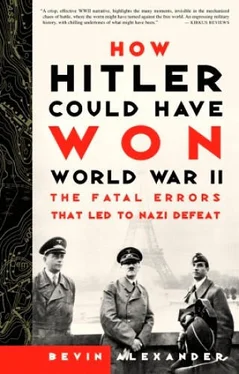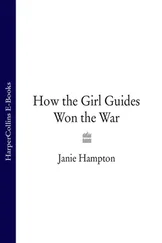In Army Group Center, Guderian’s Panzer Group 2 plunged across the Bug River at Brest-Litovsk, and Hoth’s Panzer Group 3 drove out of East Prussia with Minsk, 215 miles northeast of Brest, as their initial objective. The Russian garrison defended the fortress at Brest, but it was hopeless because German infantry surrounded it and pounded it into submission in a week.
Since the Russians were surprised, Guderian’s panzers got across the Bug easily, some of his tanks fording thirteen feet of water using waterproofing developed for Operation Sea Lion.
Two days later, while meeting with a group of panzer commanders at Slonim, a hundred miles northeast of Brest, two Russian tanks appeared out of the smoke, pursued by two German Mark IVs. The Russians spotted the officers.
“We were immediately subjected to a rain of shells, which, fired at such extremely close range, both deafened and blinded us for a few moments,” Guderian wrote.
Most of the officers were old soldiers who hit the ground, and were uninjured. But a rear-echelon colonel visiting from Germany didn’t react fast enough and was badly wounded. The Russian tanks forced their way into the town, firing away, but were finally put out of action.
As the panzers moved eastward and enveloped both sides of the Russian forces around Bialystok, Field Marshal Bock ordered his infantry 4th and 9th Armies to encircle these bypassed Russians (twelve divisions) east of Bialystok. The first great Kesselschlacht began to develop.
By June 28, Guderian’s panzers had reached Bobruysk on the Beresina River, 170 miles northeast of Brest-Litovsk, while Hoth’s tanks had seized Minsk, eighty miles northwest of Bobruysk, thereby nearly closing off fifteen Russian divisions in another caldron west of Minsk.
The Germans learned that they could outmaneuver the Russians with their Schnellentruppen, or fast troops, but could not outfight them. Everywhere the Russians resisted stoutly. They were slow to panic and surrender when closed into caldrons. One German general described the first days of the campaign: “Nature was hard, and in her midst were human beings just as hard and insensitive—indifferent to weather, hunger, and thirst. The Russian civilian was tough, and the Russian soldier still tougher. He seemed to have an illimitable capacity for obedience and endurance.”
In both Kesselschlachten the Russians took advantage of the fact that the panzers had moved on, and German infantry had to close the circles. Many escaped, though in small groups. Those who remained fought doggedly, but made only limited efforts to break out. Part of the reason was the strong rings the Germans finally threw around the surrounded troops. Another was that Soviet commanders feared they would be shot if they ordered withdrawal—something that shortly did happen. Another was that the Russians had few vehicles and little means to escape. The Russians also were more willing to surrender in the first weeks of the war because they did not know the murderous treatment they would receive in captivity. These factors explain the stupendous numbers of Russians who passed into German POW cages during the summer of 1941.
It did not take the Russian people many weeks to realize they were facing an implacable, bloodthirsty foe, however. The anti-Bolshevik indoctrination of the German army had led to a feeling of intolerance of and superiority over Russian “Untermenschen.” Hitler directed that soldiers guilty of breaking international law were to be excused. This no-court-martial order released barbaric tendencies in many soldiers, and the “commissar order” caused some to feel any Red—commissar, or ordinary soldier—might be shot on the spot.
Only a few days after the start of the campaign, General Joachim Lemelsen, commander of Guderian’s 47th Panzer Corps, complained that shootings of Russian POWs and deserters were not being done properly. He explained the correct method:
“The Fuehrer’s instruction calls for ruthless action against Bolshevism (political commissars), and any kind of partisans [guerrillas]. People who have been clearly identified as such should be taken aside and shot only by an order of an officer.”
Since the Germans could label anybody a commissar or a partisan, Russians soon stopped surrendering and often fought to the death in desperate situations.
This was not true in the caldron battles around Bialystok and Minsk, and up to July 9 the Germans took 233,000 prisoners, including numerous generals, 1,800 cannons, and destroyed 3,300 tanks, but very few T-34s, which appeared only a few times and in small numbers. Even so, about as many Russians escaped from the German pincers as were caught within them.
Meanwhile Hoth’s and Guderian’s panzer groups, now formed into the 4th Panzer Army under Günther von Kluge, were already rushing 200 miles beyond Minsk for the third great series of encirclements near Smolensk. Since Army Group Center’s infantry divisions were still miles behind the panzers, Kluge wrapped his tanks, half-tracks, and motorized divisions around three caldrons, two smaller ones east of Mogilev and west of Nevel, a greater one between Orscha and Smolensk.
After grim resistance the Germans shattered three Soviet armies, and by August 6 had taken 310,000 POWs, destroyed 3,200 tanks, and captured 3,100 guns. Nevertheless, about 200,000 Russians escaped to fall back and continue to block the road to Moscow.
In the other two army groups advances had been spectacular as well.
In Army Group South, Kleist’s Panzer Group 1, with the help of 17th Army and a Hungarian corps, encircled two Russian groups around Uman, 120 miles south of Kiev, capturing 103,000 Russians.
Army Group North occupied Latvia. Panzer Group 4 (Hoepner) pressed through Ostrov, about two hundred miles southwest of Leningrad, while 18th Army (Küchler) penetrated into Estonia. The Finns, who had joined the Germans, moved down the Karelian isthmus but did not threaten Leningrad.
Because Stalin had made the colossal error of pushing most of his forces to the frontier, where they were largely overrun or captured in encirclements, the Germans, despite the widely diffused nature of their offensive, were within sight of victory. Indeed, both Hitler and Halder thought they had won. However, instead of taking advantage of Stalin’s potentially fatal mistake, Hitler commenced a series of disastrous delays and vacillations that canceled out his victories.
The success in Army Group Center had been astonishing. There were few Soviet troops still guarding the Moscow road. A stunning opportunity had materialized. Guderian’s and Hoth’s tanks had advanced 440 miles in six weeks, and were only 220 miles from Moscow. The dry weather was certain to continue until autumn. Although tank strength had fallen to half that at the start, there was every reason to believe the remaining armor could reach the capital and drive a dagger into the heart of the Soviet Union.
The successes of the caldron battles had reinvigorated Brauchitsch and Halder in thinking that everything possible should be committed to the central front and capture of Moscow. Yet at this moment Hitler turned the campaign in a completely different direction—and thereby lost the one chance that the caldron battles had given him to seize Moscow. Ignoring the virtually open road to the capital, he issued a directive on July 19 ordering Hoth’s panzer group to turn north to assist Leeb’s advance on Leningrad, and Guderian’s panzer group to swing south and help Rundstedt’s army group seize Kiev.
Guderian went to a conference at Army Group Headquarters at Novi Borisov on July 27 to be informed of the new orders. Here he learned he’d been promoted to army commander and his group renamed Panzer Army Guderian, and he was outraged by instructions to halt the advance on Moscow.
Читать дальше


![Джонатан Димблби - Barbarossa - How Hitler Lost the War [calibre]](/books/385421/dzhonatan-dimblbi-barbarossa-how-hitler-lost-the-w-thumb.webp)









